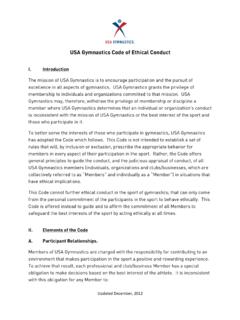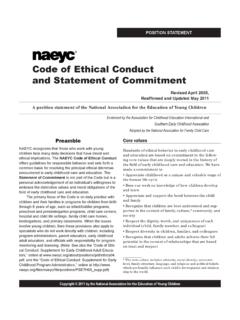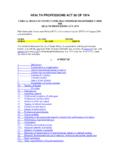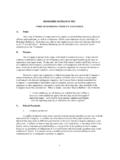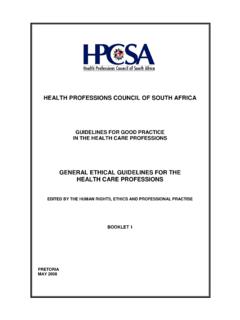Transcription of Professional Behaviour and Ethical Conduct - About Us
1 Code of Practice relating to: Professional Behaviour and Ethical Conduct Promoting transparency and enhancing public confidence in the dental profession February 2012. Code of Practice relating to: Code of Practice: Professional Behaviour and Ethical Conduct Professional Behaviour and Ethical Conduct Introduction Contents Welcome to the Dental Council's updated Professional Behaviour and Ethical Conduct '. We intend this booklet to be useful to both the dental profession and members of the public. Introduction 3 The Dental Council promotes high standards of Professional Conduct 1. Guiding principle of the Code 4 and Professional education because society expects the dental 2. General principle of the Code 4 profession to safeguard patients' health and safety and to act in their 3.
2 Your responsibility to your patients 4 patients' best interest at all times. 4. Treating your patients 6 Moral principles do not stay the same and need to evolve. They are 5. Communicating with your patients 7 influenced by the world in which we live including the changing relationship between patient and dentist. We acknowledge that 6. Professional fees 8. evolution and invite you to reflect on the uniqueness of every patient- 7. Patient consent 9 dentist relationship. In this booklet we set out to inform you of the 8. Adverse events 10 moral code overseeing the care of dental patients. In doing this, we 9. Patient records 11 renew our commitment to high standards of patient welfare and safety 10. Confidentiality 13 while respecting the rights of those affected by this Code.
3 11. Patient welfare 14 We want you to understand the Ethical duties expected of dentists. Our 12. Professional relationship with patients 14 Code does not attempt to prescribe for all possible events that may occur in the patient-dentist relationship. We encourage you to consider 13. Other Professional responsibilities 15. how the profession can serve the best interests of a patient and their 14. Ceasing practice 16 communities. 15. Your responsibility to the community 17. 16. Your responsibility to the profession 18. Dr Eamon Croke 17. Your relationship with the Dental Council 20 President 18. General 22. Acknowledgements 23. Dental Council February 2012 PAGE 3. Code of Practice: Professional Behaviour and Ethical Conduct Code of Practice: Professional Behaviour and Ethical Conduct 1 gender.
4 Guiding Section 66 of the Dentists Act 1985 requires the Dental Council to guide the dental profession on marital status;. principle everything to do with Ethical Conduct and family status;. of the Code Behaviour . As a practising dentist, we expect you sexual orientation;. to meet the highest standards of Professional religion;. practice and Behaviour and to uphold the good age;. reputation of the profession in the community. disability;. If you fail to comply with this guidance, it may result in fitness to practise proceedings being race; or taken against you under the Dentists Act 1985 membership of the Traveller community. You must try to care and treat all patients and always act in their best interest. You must show courtesy and respect in all 2 your dealings with patients.
5 General To promote confidence and trust between you, your patients and the wider community, you Emergency care principle should aim to: of the Code We expect you to make reasonable safeguard the health and safety of your arrangements to give your patients access to patients; emergency out-of-hours care. promote the dental welfare of the You must always respond to a dental community; and emergency even if the emergency involves maintain appropriate standards in all aspects patients who do not normally attend your of your life, both personal and Professional . practice. Additionally, you should never knowingly give Insurance false, incorrect or misleading information to a patient, the Dental Council or any third party. You must hold appropriate Professional indemnity cover (insurance).
6 Knowledge and skills You must keep your Professional knowledge 3 and skills up-to-date and undertake Your Welfare continuing Professional development (CPD). responsibility Your main duty is to ensure the safety and to your patients welfare of your patients no matter what their: PA G E 4 Dental Council February 2012 Dental Council February 2012 PAGE 5. Code of Practice: Professional Behaviour and Ethical Conduct Code of Practice: Professional Behaviour and Ethical Conduct 4. Treating your No commission treatment with your patient before carrying patients You must not pay or accept commission in out the treatment. return for obtaining patients. If you are proposing a new or untested A patient's best interest treatment for a patient that does not have a sound evidence base, you must tell them You must not encourage a patient to undergo the treatment is new and talk through the any treatment that is not in their best interest.
7 Risks associated with it. Unjustified or unwanted treatment Patients entitled to a second opinion You should only carry out treatment which Patients are entitled to a second opinion. If you can justify. a patient requests it, you should refer them You should not carry out treatment that is to another dental health Professional . against your patient's wishes. In the case of a dependant patient (for example, a child), you must respect the wishes of their parent or guardian. Your competence 5. Communicating It is essential that you maintain good You must only undertake treatments that you communication with your patients. Before are competent to complete safely and to a with your you begin any treatment, you must be satisfactory standard.
8 Patients satisfied that your patient understands: If you do not have the necessary skills to carry the diagnosis;. out a recommended treatment, you should treatment plan;. refer the patient to another dental healthcare likely outcomes; and Professional who does. the costs involved. Treatment must be completed This is particularly important if your If you accept a patient for treatment, you patient's first language is different to your must complete the agreed course of treatment own. safely and to a satisfactory standard. Patients' questions Patient information You must be prepared to respond to your You must not give your patient an unrealistic patients' questions: expectation About the outcome of treatment. professionally.
9 You should talk through the risks of any openly;. PA G E 6 Dental Council February 2012 Dental Council February 2012 PAGE 7. Code of Practice: Professional Behaviour and Ethical Conduct Code of Practice: Professional Behaviour and Ethical Conduct honestly; and Estimates using language they can understand. We recommend that you give an estimate of Give patients a full explanation costs in advance and in writing. If the estimate needs to be revised as treatment You have a duty to explain to your patients progresses, you should give a full explanation the range of treatment options available and of the revised costs as early as possible. the risks associated with each option. You must give your patients enough information, in language they understand, so they can 7.
10 Make informed decisions About their care. Patient You must get the informed consent of your patient before you begin any treatment. Complaints procedure consent Approach to consent We expect your practice to have a complaints procedure on public display which clearly You must obtain verbal or written consent, outlines how: including consent to treatment costs, before starting treatment. Getting written to make a complaint; and consent is recommended when the patient how your practice would deal with it. is undergoing extensive treatment. This procedure should identify by name the You must get written consent if the person who deals with patients' complaints. treatment is being carried out under sedation or general anaesthesia.
